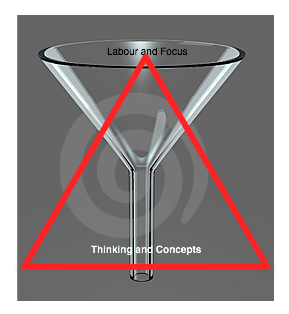Home
> Research Methods > Emerging Data Analysis Strategy
Emerging Data Analysis Strategy
Its been almost a month since my last post…what’s up I hear you ask. I’ve not been a slacker – I can promise you. Instead I’ve been working like a trojan on data analysis. Every spare minute of the part-time student’s day has been spent on this phase of the MRes project, and like other phases it has been quite distinct with its own demands and quirks.
My deliberate strategy was to work in 3-4 linear steps as follows:
- Grounded Coding for all sources: interviews and documents
- Framework Analysis for all sources: Using Hodgson, Alvesson, Sveningsson, Willmott’s theoretical categories.
- Discourse Analysis for all sources
- Cognitive Mapping for theory building
Well, was I unrealistic or what? To do all of this would take me a year or more!! I have 21 interviews, 160,000 plus words, and many documents…so how I ever thought I could manage that level of detailed analysis I’ll never know. :o) Instead, I find myself making some changes on the fly. Here is the latest emerging data analysis strategy:
- This “grounded” coding step has not changed a great deal, and I have already established some 800+ codes. I continue to iteratively group these and try to remove the ‘noise’ from the data as per the advice from my supervisor who has been checking in every few weeks on my progress. A small change is my decision to compile short abstracts for each interview in the form of memos in order to build a picture of each individual’s identity – as project managers or not as I have found.
- The framework coding step will be executed not from the source data but instead from my 800 “grounded codes” and their groups with some direct source coding from time to time. I’m not writing off the possibility of revisiting transcripts and documents again – but this should reduce the work and help me move to thinking more conceptually.
- Discourse Analysis will be only on the extracts of the “texts” I take from the sources to demonstrate the evidence. I’ve just read Jan Blommaert’s book ‘Critical Discourse Analysis’ to try to help me – however, I will admit other than some guidelines to the importance of indexicality, context, voice, ideology, and identity, I’m still missing the ‘how’ I’m going to do this part. To be fair, on route while doing step one, I have managed to at least extract some overall case study discourses of project managers, the PMO, and management. Much still to do here, and I hope after reading James Gee’s book ‘An Introduction to Discourse Analysis’ the mist might clear here.
- Cognitive Mapping will remain the same – although during step 1/2 this has already started with some scribbles on an a3 sheet of paper.
 So far the grounded coding has been taking around 4 hours per interview…so it feels to some extent that I’m moving through a funnel that over time is reducing my labour time but concomitantly increasing the thinking time and depth. It is certainly not as linear process as I first predicted. Largely, I’m just surrendering myself to this whole process. I am continuing to read or re-read the relevant literature on critical project management studies and identity work and regulation when I get time.
So far the grounded coding has been taking around 4 hours per interview…so it feels to some extent that I’m moving through a funnel that over time is reducing my labour time but concomitantly increasing the thinking time and depth. It is certainly not as linear process as I first predicted. Largely, I’m just surrendering myself to this whole process. I am continuing to read or re-read the relevant literature on critical project management studies and identity work and regulation when I get time.During this past month, sometimes I feel I have absolutely nothing for my efforts and I get quite scared as if I’m wandering around a wilderness without a compass, and at other times I feel like I’m on the edge of finding something very cool. It’s kind of like a pendulum I swing through.
All in all the analysis stage is so far a quite enjoyable phase. Of course, I haven’t been writing for a couple of months since the data collection started – and maybe that will start again soon.
How have others found similar changes in their data analysis stage – or is this just me making things up as I go along?
All the best, Michael
Categories: Research Methods
Data Analysis, Discourse Analysis
Comments (0)
Trackbacks (0)
Leave a comment
Trackback